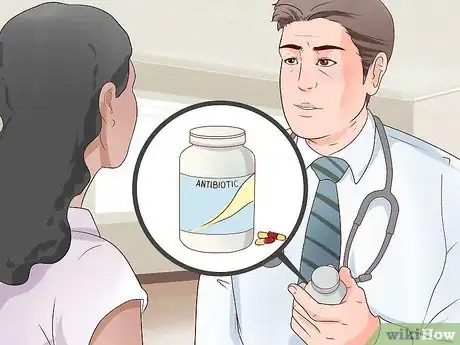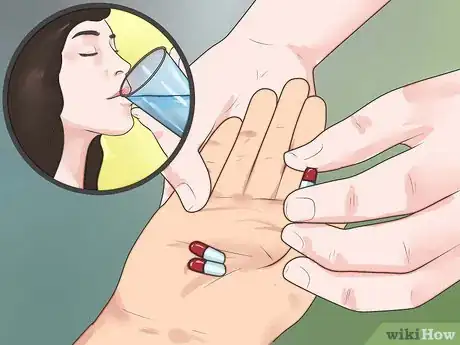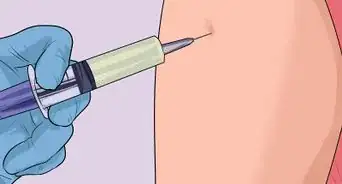This article was co-authored by Carrie Noriega, MD. Dr. Noriega is a Board Certified Obstetrician & Gynecologist and medical writer in Colorado. She specializes in women’s health, rheumatology, pulmonology, infectious disease, and gastroenterology. She received her MD from the Creighton School of Medicine in Omaha, Nebraska and completed her residency at the University of Missouri - Kansas City in 2005.
There are 13 references cited in this article, which can be found at the bottom of the page.
wikiHow marks an article as reader-approved once it receives enough positive feedback. In this case, 87% of readers who voted found the article helpful, earning it our reader-approved status.
This article has been viewed 217,666 times.
Syphilis is a sexually transmitted disease (STD) caused by the bacterium Treponema pallidum. This STD is highly infectious and can cause irreversible damage to the nerves, body tissues and brain. If left untreated, it may even cause death. If detected in the early stages, syphilis is easy to cure. In latent stages, treatments may need to be more aggressive.
Steps
Discussing Your Condition with a Health Professional
-
1Recognize the early symptoms of syphilis. If you think you have syphilis, then you will need to seek a diagnosis and medical treatment. Syphilis has multiple stages with different types of symptoms. These symptoms may come and go, but it doesn’t mean the disease is gone unless you have been treated. In the later stages, you may have no symptoms of syphilis itself but instead suffer from severe effects such as brain, liver, nerve, and bone damage. Early symptoms of syphilis include:[1]
- A chancre, which is a small sore that appears near your mouth, anus, penis, or vagina. This is typically associated with swollen lymph nodes in the groin area.
- A rash that starts on your torso and then spreads to the rest of your body, including palms and soles which is indicative of the secondary stage of syphilis
- Warts around the mouth and/or genitals.
- Muscle aches
- Fever
- Sore throat
- Swollen lymph nodes
-
2Know the complications of late stage syphilis. In the latent or later stages of syphilis, the early symptoms disappear. Without treatment you can continue to carry syphilis for years. 10 to 30 years after the initial infection you may develop late stage syphilis. This can cause severe symptoms, including:[2]
- Difficulty coordinating your muscle movements
- Paralysis
- Numbness,
- Blindness
- Dementia
- Organ damage that can lead to death
-
3Get a formal test for syphilis. A variety of tests can be used to detect syphilis and the stage of its progression. These can range from examination of the sores’ fluid to spinal fluid examination and echocardiograms. Most commonly, a quick and cheap blood test is sufficient to diagnose syphilis.[3]
- Blood tests are used to confirm antibodies your body makes to fight the illness.[4]
- Testing fluid scraped from sores will show the presence of the bacteria, but can only be done when sores are present.[5]
- Spinal fluid tests should be used when you think you may have cerebral forms of this disease.[6]
-
4Inform a physician if you are pregnant before beginning syphilis treatment. Certain antibiotics can be dangerous to the developing baby if used during pregnancy. Penicillin is typically used to treat syphilis in pregnant women. Penicillin G is the only known means by which to prevent transmission of syphilis to the child during pregnancy.[7] Syphilis during pregnancy greatly increases the chances of stillbirth.[8]
-
5Ask about alternative antibiotics if you have a penicillin allergy. Other antibiotics that can be used to treat syphilis include tetracycline, doxycycline, cephalothin, and erythromycin. Consult your doctor to learn more about these medicines and how they might work for you. Do not take medicine that has not been prescribed to you.
Getting the Appropriate Treatment
-
1Follow treatment plans for syphilis. If you are in the first stage of the disease, you may only need a single injected dose of antibiotics; however, you will need to return multiple times within the next 12 months to get re-tested for the disease. You may even need to be re-treated if the infection has not disappeared.
-
2Do not skip doses. If your treatment plan for syphilis requires multiple doses over several days or weeks, it is crucial that you do not skip any doses. By not taking your full regimen of medicine, you risk not eliminating the infection. Then you may have to return for another round of treatment.
- Antibiotic treatment courses work most effectively when taken according to the plan recommended by the physician or pharmacist. Taking the full course also helps prevent the development of antibiotic-resistant strains of the disease.
- Treatment of secondary syphilis may last an entire year but is essential to avoid the permanent disability that can be caused by tertiary syphilis.
-
3Return for regular testing. This not only ensures that you have successfully eliminated the syphilis infection but also enables swift diagnosis and re-treatment if you later become infected again. During this time of regular testing, you should avoid sexual contact. You should also take this opportunity to be tested for HIV.[14]
- Having syphilis once does not make you immune to the disease. You can be reinfected even after successful treatment of the disease.[15]
Preventing Transmission of Syphilis During Treatment
-
1Abstain from sexual contact. If you currently have syphilis, it is essential that you protect others from the disease, even if you are already on antibiotics. The disease may still be transmitted during treatment, even when physical symptoms are not present. If you are infected, it is your responsibility to avoid all sexual contact (oral, anal, and vaginal sex) during treatment to prevent transmission of the disease.[16]
- If you have sores on your mouth, then you should not even kiss anyone because the disease may pass through the sores.[17]
-
2Inform all sexual partners of your infection. This includes former partners who may have been exposed to your infection prior to treatment. It is essential all partners are informed so that they can seek testing and treatment if necessary, or decide to decline sexual interaction with you until you are completely free of the illness. Failure to do so may increase risk of transmission.[18]
-
3Use a latex condom. This barrier method may help prevent transmission of syphilis during treatment. Make sure that you use condoms during all acts of vaginal, oral, and anal sex. Keep in mind that condom use is only effective if all of the affected areas are covered to prevent contact with the mucus membranes or broken skin of a sexual partner.[19]
- Make sure that you use dental dams or latex barriers when performing oral sex on a female partner.
Expert Q&A
-
QuestionDoes Amoxicillin 500 mg treat syphilis?
 Carrie Noriega, MDDr. Noriega is a Board Certified Obstetrician & Gynecologist and medical writer in Colorado. She specializes in women’s health, rheumatology, pulmonology, infectious disease, and gastroenterology. She received her MD from the Creighton School of Medicine in Omaha, Nebraska and completed her residency at the University of Missouri - Kansas City in 2005.
Carrie Noriega, MDDr. Noriega is a Board Certified Obstetrician & Gynecologist and medical writer in Colorado. She specializes in women’s health, rheumatology, pulmonology, infectious disease, and gastroenterology. She received her MD from the Creighton School of Medicine in Omaha, Nebraska and completed her residency at the University of Missouri - Kansas City in 2005.
Board Certified Obstetrician & Gynecologist Penicillin G is the gold standard antibiotic and should be used whenever possible. Amoxicillin can be substituted using 3 grams per day but it needs to be combined with probenecid for it to be effective.
Penicillin G is the gold standard antibiotic and should be used whenever possible. Amoxicillin can be substituted using 3 grams per day but it needs to be combined with probenecid for it to be effective. -
QuestionCan I take Keflex as an antibiotic for treating the early stage of syphilis?
 Carrie Noriega, MDDr. Noriega is a Board Certified Obstetrician & Gynecologist and medical writer in Colorado. She specializes in women’s health, rheumatology, pulmonology, infectious disease, and gastroenterology. She received her MD from the Creighton School of Medicine in Omaha, Nebraska and completed her residency at the University of Missouri - Kansas City in 2005.
Carrie Noriega, MDDr. Noriega is a Board Certified Obstetrician & Gynecologist and medical writer in Colorado. She specializes in women’s health, rheumatology, pulmonology, infectious disease, and gastroenterology. She received her MD from the Creighton School of Medicine in Omaha, Nebraska and completed her residency at the University of Missouri - Kansas City in 2005.
Board Certified Obstetrician & Gynecologist No, Keflex is not one of the recommended antibiotics for treating syphilis.
No, Keflex is not one of the recommended antibiotics for treating syphilis.
Warnings
- Be sure to go get proper treatment for syphilis and attend for any check ups that are suggested. If you allow the infection to reach the final tertiary stage there are no treatments that can cure the disease.⧼thumbs_response⧽
- Genital sores make it easier to transmit and receive HIV infection during sexual activity.⧼thumbs_response⧽
- Do not participate in sexual activities if there is an unusual discharge, sore, or rash in the genital area. Seek medical attention as soon as possible.⧼thumbs_response⧽
- Condoms lubricated with spermicides are no more effective than other lubricated condoms in preventing the spread of STDs.⧼thumbs_response⧽
- Untreated syphilis in a pregnant woman can infect, and possibly kill, a developing baby.⧼thumbs_response⧽
- Reported cases of syphilis (as well as other STIs) are on the rise since the first time since 2006.[20] The risks of syphilis may not be as well-known in the US and it's important to understand the severity of the disease.⧼thumbs_response⧽
References
- ↑ https://www.nhs.uk/conditions/syphilis/symptoms/
- ↑ http://www.cdc.gov/std/syphilis/stdfact-syphilis.htm
- ↑ https://my.clevelandclinic.org/health/diseases/4622-syphilis
- ↑ https://www.uofmhealth.org/health-library/hw5839
- ↑ https://my.clevelandclinic.org/health/diseases/4622-syphilis
- ↑ https://www.uofmhealth.org/health-library/hw5839
- ↑ https://www.cdc.gov/std/syphilis/CTApreg.htm
- ↑ https://www.marchofdimes.org/complications/syphilis-in-pregnancy.aspx
- ↑ https://www.cambridge.org/core/journals/epidemiology-and-infection/article/syphilis-antibiotic-treatment-and-resistance/D8519DE049A3F96B18C7F29A50E5D437
- ↑ https://www.cambridge.org/core/journals/epidemiology-and-infection/article/syphilis-antibiotic-treatment-and-resistance/D8519DE049A3F96B18C7F29A50E5D437
- ↑ https://www.cambridge.org/core/journals/epidemiology-and-infection/article/syphilis-antibiotic-treatment-and-resistance/D8519DE049A3F96B18C7F29A50E5D437
- ↑ https://patient.info/doctor/jarisch-herxheimer-reaction
- ↑ http://www.mayoclinic.org/diseases-conditions/syphilis/basics/treatment/con-20021862
- ↑ http://www.mayoclinic.org/diseases-conditions/syphilis/basics/treatment/con-20021862
- ↑ http://www.cdc.gov/std/syphilis/stdfact-syphilis.htm
- ↑ http://www.mayoclinic.org/diseases-conditions/syphilis/basics/treatment/con-20021862
- ↑ http://www.hhs.gov/opa/reproductive-health/stis/syphilis/
- ↑ http://www.avert.org/sex-stis/sexually-transmitted-infections/syphilis
- ↑ https://www.mayoclinic.org/diseases-conditions/syphilis/symptoms-causes/syc-20351756
- ↑ http://www.cdc.gov/nchhstp/newsroom/2015/std-surveillance-report-press-release.html
About This Article
If you think you might have syphilis, see a medical professional as soon as possible. When you talk to your doctor, they'll probably have you take a blood test so they can diagnose you. If the test comes back positive, your doctor may inject you with a single dose of antibiotics, or they might prescribe you medication to take over several days or weeks. Make sure you take all your medication as prescribed so your infection goes away. Also, schedule a follow up appointment with your doctor to be retested and re-treated if necessary, because it can take up to a year to get rid of it completely. For information from our Medical reviewer on how to recognize the early symptoms of syphilis, scroll down!













-Step-17.webp)


-Step-11-Version-2.webp)




-Step-10.webp)
-Step-13.webp)














-Step-17.webp)



































Medical Disclaimer
The content of this article is not intended to be a substitute for professional medical advice, examination, diagnosis, or treatment. You should always contact your doctor or other qualified healthcare professional before starting, changing, or stopping any kind of health treatment.
Read More...